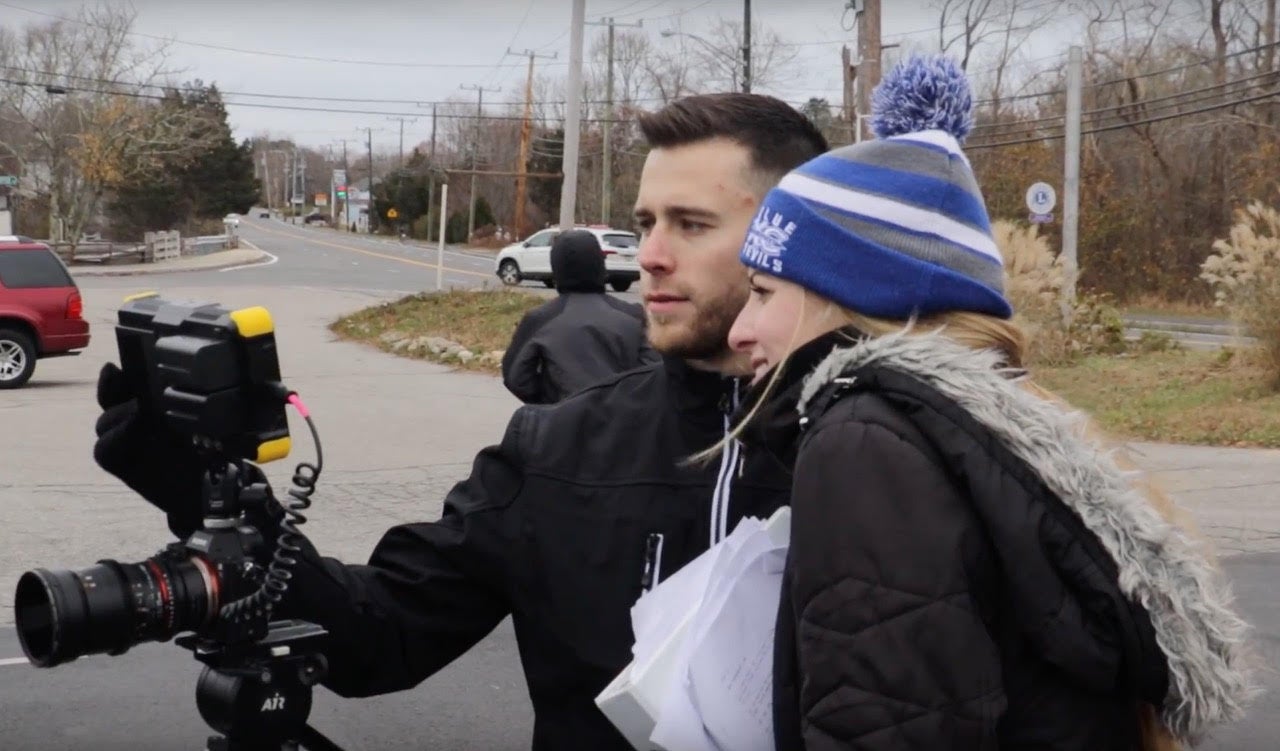KINGSTON, R.I. – Dec. 5, 2019 – Alyssa Botelho ’20 is pretty sure she still has a note from her 4-year-old self telling of her plans to be a writer someday. The dream changed to screenwriter as she got into movies in middle school, and writer-director when she started making films in high school.
This semester, Botelho’s goals have come into clearer focus as she wrote and directed her most challenging film project yet in an advanced film production class in the Harrington School of Communication and Media. Her film, “Junkie,” is one of nine short films made by the 20 students in FLM 445: Advanced Narrative Production that will be screened Wednesday, Dec. 11, at 6 p.m. in Edwards Hall, 64 Upper College Road, on the Kingston Campus. The screenings, which include a handful of 16mm films by students in FLM 351, are free and open to the public.

Keith Brown, teaching professor in film production, says the end-of-semester screenings celebrate the students and the program, attracting family, friends, students and alumni of the program. “This is the event that all the students look forward to every semester,” he says. “These films aren’t just accomplishments for students in the class, but many students in lower-level classes come to see them with anticipation of what they will be able to do, and many of those students help out with these productions.”
The nine FLM 445 shorts range in length from 5 to 20 minutes and include genres from sci-fi to comedy, from thriller to drama. “It’s interesting because every semester is different,” says Brown, who has been teaching advanced film production since joining URI in 2007.
Botelho’s 20-minute film, “Junkie,” is about a drug addict who reaches his breaking point and finds help from the police officer who arrests him for shoplifting. “Although most of the story is fictional, its heart and soul are based on a true story from a family member who’s in law enforcement,” says Botelho, of Fairhaven, Mass. “As he described the way he arrested a man stealing from a store, I could see the scene play in my head already.”
Griffin Alix ’20, of Southington, Conn., wrote and directed “Blackbile,” a pseudo-documentary inspired by the Jonestown massacre in 1978 when the Rev. Jim Jones induced followers to commit “revolutionary” suicide. “I knew I would want to make a horror film,” says Alix, a film/media and public relations major. “I’ve been heavily invested in the genre since I first started seriously watching movies.”
Botelho and Alix were among the seven students selected at the start of the semester to direct their own scripts, projects that joined two class productions. Many of the students crew on several of the productions, taking on the countless jobs needed to make a film. And some retake the class to try their hand at new roles or perfect skills.
After weeks of preparation – choosing scripts, troubleshooting possible problems, casting actors, securing locations – the student film crews began shooting on location in November. Then, in just short weeks, the students went into post-production, editing rough cuts, critiquing and polishing their films for screening.
“Most of their weekends by mid-semester are taken up with these movies,” says Brown. “They’re really going all over the place to cast their films and find real locations to shoot. The fact this can all be done in one semester really blows my mind.”
Botelho, a double major in film and business management, worked on “Junkie” for a good 20 hours a week during the semester. Before that, she spent months writing and rewriting the screenplay. The script finally came together when she changed the point of view from the officer to the drug addict. “It seemed to give the story more importance,” says Botelho. “Along the way, I realized that many people can relate to this struggle because of the growing drug epidemic. If I can give just one person a sliver of hope with this film, it’ll make it all worth it.”
The most hectic stretch was the three days of filming. Botelho and her crew shot on location at six sites in Massachusetts and Rhode Island. She had hired several actors from New York and had to arrange their travel and lodging. “Making the entire filming schedule and coordinating dozens of moving parts was a lot of pressure and the most intense test of mental agility,” she says.
As for most of the films, Alix ran a crowdfunding campaign to finance his film, “Blackbile.” Luckily, he says, his costs weren’t as large as some of the projects. His actors, many secured through a casting website, worked for free, and the locations he chose were also free.
But production wasn’t without its hurdles. Confirmation to film at the Whispering Pines Conference Center on the W. Alton Jones Campus didn’t come through until just days before filming, and extras in the cult meeting scene presented some headaches. But both worked out.
“Very few production classes allow you to dedicate an entire semester to just one or two projects,” says Alix, who also appeared as a masked murderer in another of the student films. “Having this amount of time allows students to really flex their strengths and dial down on any one aspect of production. My biggest take-away from the course is how many moving parts there are to making a film, and there’s no such thing as planning too far ahead. This course absolutely made that point clear.”
After the screenings, Alix plans to submit “Blackbile” in a number of film festivals geared toward horror films, and Botelho says she will submit “Junkie” to festivals around the country.

